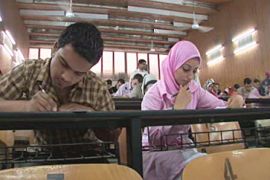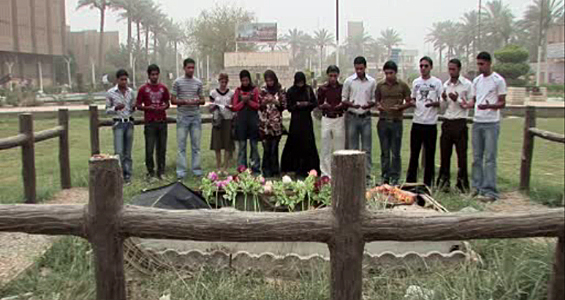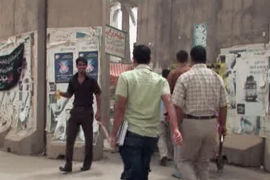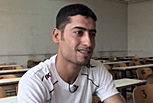
Baghdad’s defiant students
Universities in the Iraqi capital struggle to survive amid the violence.

In the final part of the series on education in conflict Al Jazeera visits the Iraqi capital Baghdad and finds students defiant in the face of attack.
Al Mustansirya in the suburb of Sadr City in Baghdad is one of the oldest universities in the world, dating back to 1234.
Keep reading
list of 4 items‘We share with rats’: Neglect, empty promises for S African hostel-dwellers
Thirty years waiting for a house: South Africa’s ‘backyard’ dwellers
Photos: Malnutrition threatens future Afghan generations
These days however it has an appearance very much synonymous with the Iraqi capital – encased by thick concrete blast walls.
Like many esteemed cultural institutions in Iraq, Al Mustansirya was a victim of the chaos and anarchy created by the US-led invasion of Iraq in 2003.
“When we took over the University it was pillars of smoke and piles of rubble. There was nothing to indicate that we could rebuild it or teach here again,” Sr Takei Al Musawi, the university’s president, says.
“We had very limited budget, actually no budget at all. But the people of Al-Mustansiriya, Iraqis in general and some religious people supported the university financially, helping it to get going again – and we thank them for that.”
By 2007 the university was fully functioning again, albeit understaffed and under resourced, but still filled with people keen to revive its great educational tradition.
Then in January of that year two car bombs and a suicide bomber struck the university in a coordinated operation. More than 70 people were killed and a further 400 injured.
Sabah Hassan Gomar, a member of the student union, still lives with the terrifying images he witnessed.
Student defiance
“Whenever I get to the university, I feel pain seeing this place. I will never forget that incident, bits of people flying all over, the students burnt almost to nothing. I will remember the remains all over the garden – and the fires at every corner,” he says.
| Watch online |
|
|
“We saw such badly deformed students, some of them totally burnt away. I saw naked survivors running everywhere. Their clothes had been blown off in the explosion.
“One thing I shall never forget is that some students were taking off their own clothes to cover naked bodies. “
The day after Al-Mustansiriya University, in Baghdad, was bombed students and teachers defiantly turned up for study. Many of the security guards who were there that day still work at the university.
“We are challenging terrorism, and we believe in God,” Saleh Mahdi, one security guard says. “We will not be frightened of those scum non-believers. If it is written to die, we will die. “
This attitude of acceptance of fate mixed with deep resolve is shared by even the youngest students.
“What I can do is to live hour by hour, or even the moment, do my duty, and when it is my time to die, I will die,” Zaman, who is in her first-year at the college of arts, says..
“Everyone takes his share of life. I have to study, and learn, and leave death to destiny.”
Who exactly was responsible for the attacks is still unclear as is why the university was chosen as a target.
One suggested theory is that Al Mustansiriya was under the control of Shia militias in Sadr City and that this provoked sectarian hostility from a Sunni Muslim faction.
‘Small Iraq’
However others believe that the principal reason for the bombing outrages is that the university actually offers a challenge to the very idea of sectarian hatred.
| First person |
|
|
“The Iraqi universities are actually the essential Iraq,” Sabah says. “You find Shia, Sunni, Kurd and Christian. The intention behind the attacks on our universities, especially Al-Mustansiriya, is to burn down that small Iraq.”
In Iraq years of sanctions and violence have taken their toll on an education system which regularly seems to be on the verge of collapse. In the last year alone student attendance has dropped from 75 per cent to 30 per cent.
Dr Falah Hassan graduated from Al Mustansiriya in the year 2000. Having returned as a professor of Arabic, he says the campus today is a changed world.
“There is no comparison between then and now; we are living through a period where education is at its lowest level in most of Iraq’s universities,” he says.
“At Al-Mustansiriya, we suffer from overcrowded conditions, the University cannot take more than 10,000 students, but this number keeps doubling.”
Hisham Abd Al Hussein is one second year student in the faculty of arts struggling to get through this year’s final exams.
The stress of exams is compounded by the pressures of surviving the chaos and danger of daily life in Baghdad and supporting his parents.
 |
| The university is now enclosed by concrete |
“We take a week off before [the exams], so I go to the shop in the morning, then study from two to six then work from six to nine, then study again until 12, and start all over the next day,” he says.
“We suffer there is no electricity and it’s difficult if you want to open a book or read.”
Brain drain
Dr Hassan says there are many security risks that prevent students from attending classes and that such absences affect the educational levels of not only the students but also of the teaching staff.
As professors and teachers are often the victims of targeted attacks, even more have fled to neighbouring countries to seek a better life.
“Lots of the professors left the profession for both security and financial reasons, that’s a well known fact,” Hassan says. “And we cannot change this reality unless we change the reasons behind it.
“Professors need to be supported financially and their security guaranteed so that the talented ones return.”
Normality is hard to come by in war zones such as Baghdad but behind the concrete barricades of Al Mustansiriya Hisham and his friends often still manage to steal a few moments of it.
“University is about education but at the same time you get to hang out with your friends and relax,” he says.
“In Iraq there are no fun places to go so we can only do so at school.”

